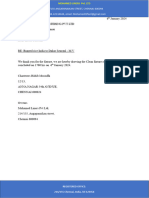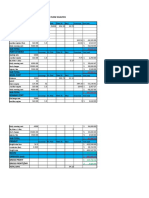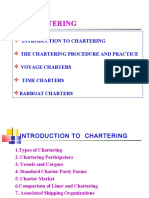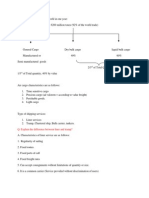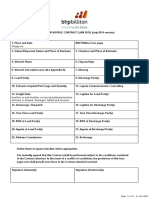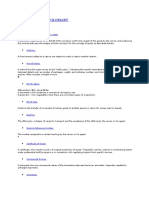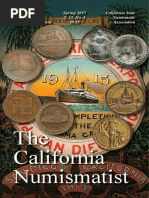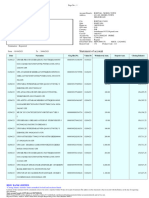Demurrage
Demurrage
Uploaded by
albertCopyright:
Available Formats
Demurrage
Demurrage
Uploaded by
albertCopyright
Available Formats
Share this document
Did you find this document useful?
Is this content inappropriate?
Copyright:
Available Formats
Demurrage
Demurrage
Uploaded by
albertCopyright:
Available Formats
Demurrage
The term Demurrage comes from the field of vessel chartering (notably voyage chartering)
and refers to the period during which the charterer remains in possession of the vessel after
the period of time normally given to him to charge and discharge the cargo (lay time). By
extension Demurrage refers to the amount of money that the charterer will have to pay to the
shipowner for its extra use of the vessel.
Because the supply of a shipping container to a merchant has a very similar nature to the
contract of a supply of a vessel to a voyage charter, the industry refers to this container usage
beyond the time allowed as Container Demurrage. This extra usage usually entitles the
container supplier (usually the shipping carrier) to claim a certain amount of money from the
merchant.
In principle it can be considered that the assimilation between vessel demurrage and
container demurrage is correct given that both refer to the same concept, which is the late
return of a piece of equipment supplied by one party to another for the purpose of carrying a
cargo. However, the actual regime of container demurrage is still to be determined precisely.
Shipping
In commercial shipping, demurrage is an ancillary cost that represents liquidated damages
for delays. It occurs when the vessel is prevented from loading or discharging cargo within
the stipulated laytime (see Affreightment: under Charter-parties).
In container haulage, customers are given a set period of time in their contract to tip (unload)
their container delivery. Acceptable times for tipping are usually between 3 and 4 hours; time
spent on site after that is considered "demurrage". Hauliers will usually charge an hourly rate
for each hour after the agreed allowed time.
Demurrage can also refer to the cost levied by shipping lines to cover redecoration of the
container after use by the merchant, but it could also be the charge made by the shipping line
to customer for not returning their container in a reasonable time.
Railway transport
In railway law, it is the charge on detention of trucks (or rolling stock), either to the shipper
for holding the car (laden or not), or to the connecting railroad(s) while the car is empty and
returning to the home road (in either case, as a way to encourage speedy unloading and return
of empties to improve utilization of rolling stock).
Business and banking
In business, demurrage is a delay in delivery of a product via delivery truck. When a delay
occurs with product delivery, the delivery party can elect to claim a no fault delay by
submitting a demurrage charge. Criteria for allowable demurrage, payment conditions, and
payment terms for demurrage are typically prenegotiated and accepted by the vendor via
contract prior to conduct of business. Some vendors allow free no-cost time for limited
hour(s) when demurrage occurs, others do not allow free time for delays. The demurrage
charge is normally an hourly rate. Unforeseeable until delivery, costs of delays are sometimes
separately invoiced from the cost of deliverable.
In banking, demurrage is the charge per ounce made by the Bank of England in exchanging
coin or notes for bullion.
Currency
Main article: demurrage (currency)
In complementary currencies' field, demurrage is a cost associated with owning or holding
currency. It is sometimes referred to as a carrying cost of money. The term was used by
Silvio Gesell. It is regarded by some as having a number of advantages over interest: while
interest on deposits lead to discount the future and to place immediate gains ahead of long-
term concerns, demurrage does the opposite, creating an incentive to invest in assets which
lead to longer-term sustainable growth. Furthermore, demurrage acts like inflation,
stimulating the circulation of the currency, encouraging economic activity, and increasing
employment.
Gas cylinders
The rental fee for a gas cylinder assessed by the vendor until the tank is returned.
You might also like
- Sample Copy SYNACOMEX 2023Document8 pagesSample Copy SYNACOMEX 2023nguyenlankt11aNo ratings yet
- Clean Fixture Recap Final (EDITED)Document3 pagesClean Fixture Recap Final (EDITED)mohamed22fazilNo ratings yet
- Velavoy2005p1 UnprotectedDocument3 pagesVelavoy2005p1 UnprotectedСимеон АйковNo ratings yet
- Abidjan Port Regulation - Pro-ShippingDocument14 pagesAbidjan Port Regulation - Pro-Shippingvodoley634No ratings yet
- Laytime Calculation Practice Exercises With SolutionDocument4 pagesLaytime Calculation Practice Exercises With SolutiondocsNo ratings yet
- ICS Examiners Report: Liner Trades May 2019Document5 pagesICS Examiners Report: Liner Trades May 2019rahul yo yoNo ratings yet
- Nav IV U2 PDFDocument19 pagesNav IV U2 PDFCosmin CaramanNo ratings yet
- SaltyAnimators Salary Collection - Salty SalariesDocument31 pagesSaltyAnimators Salary Collection - Salty SalariessnyderlinNo ratings yet
- The Institute of Chartered Shipbrokers: Answer Any FIVE Questions - All Questions Carry Equal MarksDocument1 pageThe Institute of Chartered Shipbrokers: Answer Any FIVE Questions - All Questions Carry Equal MarksDeepak ShoriNo ratings yet
- CP Shipping Desk 2018Document18 pagesCP Shipping Desk 2018Farid OMARINo ratings yet
- Voyage Cash Flow AnalysisDocument4 pagesVoyage Cash Flow AnalysisNivaldo Pedro100% (1)
- Unlock Gencon94Document4 pagesUnlock Gencon94boninhNo ratings yet
- Guidelines For Appropriations: Printed 1 June 2014Document7 pagesGuidelines For Appropriations: Printed 1 June 2014BrandonNo ratings yet
- Standard Liner and General Agency Agreement: The Federation of National Associations of Ship Brokers and AgentsDocument5 pagesStandard Liner and General Agency Agreement: The Federation of National Associations of Ship Brokers and AgentsKannan C ChandranNo ratings yet
- Group Assignment - AdvertisingDocument2 pagesGroup Assignment - AdvertisingalbertNo ratings yet
- Solution of Matrix PDFDocument9 pagesSolution of Matrix PDFalbertNo ratings yet
- Charter PartiesDocument25 pagesCharter PartiesRohitNo ratings yet
- CharteringDocument86 pagesCharteringdetrusitolNo ratings yet
- Laytime CalculationDocument1 pageLaytime CalculationPham ThảoNo ratings yet
- Voyage CharterDocument7 pagesVoyage CharterzprockartNo ratings yet
- NvoccDocument13 pagesNvoccjikkuabraham2No ratings yet
- Liner ShippingDocument8 pagesLiner ShippingMayank BhattNo ratings yet
- BHP VOY13 - 2014 EditionDocument24 pagesBHP VOY13 - 2014 EditionGavaksh Bhatnagar0% (1)
- Sample Copy NYPE 2015Document32 pagesSample Copy NYPE 2015jose montoya100% (1)
- Baltic Code 2020 - CharteringDocument3 pagesBaltic Code 2020 - CharteringMark Mirosevic-SorgoNo ratings yet
- Abbreviations and Legal Terms - v20210701Document3 pagesAbbreviations and Legal Terms - v20210701Biswajit Q MalakarNo ratings yet
- Port ServicesDocument11 pagesPort ServicesIsabelle Bañadera LcbNo ratings yet
- Report Tanker Cargo HandlingDocument17 pagesReport Tanker Cargo HandlingRazaq PayapoNo ratings yet
- Current Date Customer Contract Quote ID:::: 26-Jul-2019 Sar Transport Systems PVT LTD 296561755 QT-SAFM-36269843-3 Offer ID 1-1 Quoted For WeightDocument5 pagesCurrent Date Customer Contract Quote ID:::: 26-Jul-2019 Sar Transport Systems PVT LTD 296561755 QT-SAFM-36269843-3 Offer ID 1-1 Quoted For WeightrinkuNo ratings yet
- Fixture NoteDocument3 pagesFixture Notenguyenmai240902100% (1)
- Structure of Shipping Agency in IndiaDocument9 pagesStructure of Shipping Agency in IndiaShubham GhandadeNo ratings yet
- Charter Party in Dry Bulk Shipping - HandyBulkDocument5 pagesCharter Party in Dry Bulk Shipping - HandyBulktkshipping.dbxNo ratings yet
- Tanker Chartering: Examiner'S Report 2013Document2 pagesTanker Chartering: Examiner'S Report 2013Seetha Krishnan100% (1)
- Clauses Applicable To Voyage and Time Charterparties: Practical Chartering Lecture 5 - Special Charterparty ClausesDocument7 pagesClauses Applicable To Voyage and Time Charterparties: Practical Chartering Lecture 5 - Special Charterparty ClausesMostafa Salah Eldin ZakyNo ratings yet
- Marinetrans, The Global Ship Spare Forwarder Covers All Ports in ChinaDocument2 pagesMarinetrans, The Global Ship Spare Forwarder Covers All Ports in ChinaGbraunmNo ratings yet
- Bill of Lading IIDocument17 pagesBill of Lading IIKumar AdityaNo ratings yet
- BIMCO Agreement ALOAR-JMSHIP - PROSPRYDocument22 pagesBIMCO Agreement ALOAR-JMSHIP - PROSPRYJuan M González CNo ratings yet
- Freight Shipping Glossary: Air Waybill (Abbreviation: AWB)Document6 pagesFreight Shipping Glossary: Air Waybill (Abbreviation: AWB)csmcargoNo ratings yet
- Voyage CalculationDocument7 pagesVoyage CalculationAntonius Dimas AndityaNo ratings yet
- Lay Time CalculationDocument17 pagesLay Time Calculationayush aththalapitiyaNo ratings yet
- Demurrage RulesDocument2 pagesDemurrage RulesSantosh BaldawaNo ratings yet
- Synacomex 2000Document5 pagesSynacomex 2000Giurca RaduNo ratings yet
- GAFTA - 72 - Insurance ClausesDocument5 pagesGAFTA - 72 - Insurance ClausestinhcoonlineNo ratings yet
- Ports of Yangon PDFDocument7 pagesPorts of Yangon PDFAndhika Putu GedeNo ratings yet
- CARGO - VGM Regulation & FlowchartDocument16 pagesCARGO - VGM Regulation & FlowchartSergey Vasilievich ChetverichenkoNo ratings yet
- Fifty Essential Shipping TermsDocument11 pagesFifty Essential Shipping Termsmuhammad zulfadli senafi100% (1)
- Effective Fuel Cost On Liner Service ConfDocument13 pagesEffective Fuel Cost On Liner Service ConfOlga RegevNo ratings yet
- Chapter Three Section 5Document79 pagesChapter Three Section 5Settipalli Praveen100% (1)
- CP Definition 9-23Document15 pagesCP Definition 9-23Abdel Nasser Al-sheikh YousefNo ratings yet
- SCD2400049Document8 pagesSCD2400049huwaeinova10seyesilNo ratings yet
- Chartering TermsDocument8 pagesChartering Termsaimri_cochinNo ratings yet
- BL Not in Conformity in Mate's Receipt (Cargo, Consignee, Disch Port & Clean BL) MattDocument2 pagesBL Not in Conformity in Mate's Receipt (Cargo, Consignee, Disch Port & Clean BL) MattSofi JiangNo ratings yet
- Freight Forwarding Learning PresentationDocument12 pagesFreight Forwarding Learning PresentationZannatun NayeemNo ratings yet
- Claims at A Glance 2012Document28 pagesClaims at A Glance 2012Kwalar KingNo ratings yet
- Loading Monitoring at Transhipment Point: Despatch: $ 10,635.63 RP 96,784,187.50Document4 pagesLoading Monitoring at Transhipment Point: Despatch: $ 10,635.63 RP 96,784,187.50masyunNo ratings yet
- Sea Cargo Manifest & Transhipment Regulations, 2018: Onboarding of CustodiansDocument13 pagesSea Cargo Manifest & Transhipment Regulations, 2018: Onboarding of CustodiansnetvadiNo ratings yet
- Difference Between Intermodal and Multimodal TransportDocument5 pagesDifference Between Intermodal and Multimodal Transportquanghuy061285No ratings yet
- Voyage Charter FDocument12 pagesVoyage Charter FKwalar KingNo ratings yet
- Concor & Inland Container DepotsDocument54 pagesConcor & Inland Container DepotsSiddhesh BridNo ratings yet
- M TYPES - Booking Note-2013Document3 pagesM TYPES - Booking Note-2013Mehmet ErturkNo ratings yet
- Lecture 4 The Four Shipping MarketsDocument40 pagesLecture 4 The Four Shipping MarketsAhmed Saeed SoudyNo ratings yet
- Introduction of CharteringDocument2 pagesIntroduction of CharteringUsuNorNo ratings yet
- Logistics Group Assignment NOV2009Document14 pagesLogistics Group Assignment NOV2009albertNo ratings yet
- Module 5 - Methods of ProcurementDocument25 pagesModule 5 - Methods of Procurementalbert100% (1)
- Case Study 1: Casflow Statements Assignment 2Document6 pagesCase Study 1: Casflow Statements Assignment 2albertNo ratings yet
- Electronic Data InterchangeDocument8 pagesElectronic Data InterchangealbertNo ratings yet
- Regulation, Deregulation or Re-Regulation of TransportDocument9 pagesRegulation, Deregulation or Re-Regulation of Transportalbert100% (1)
- Order Block PDF by Daytradingrauf FinalDocument7 pagesOrder Block PDF by Daytradingrauf FinalalbertNo ratings yet
- Reverse Logistics: Business ImplicationsDocument2 pagesReverse Logistics: Business ImplicationsalbertNo ratings yet
- International Commercial Terms (INCOTERMS)Document9 pagesInternational Commercial Terms (INCOTERMS)albertNo ratings yet
- Incoterms: Group E - DepartureDocument4 pagesIncoterms: Group E - Departurealbert100% (1)
- Railway Passenger HandlingDocument7 pagesRailway Passenger HandlingalbertNo ratings yet
- Economic SurplusDocument3 pagesEconomic SurplusalbertNo ratings yet
- Difference Between Advertising and PromotionDocument2 pagesDifference Between Advertising and PromotionalbertNo ratings yet
- Change ManagementDocument2 pagesChange ManagementalbertNo ratings yet
- Public Service AdvertisingDocument19 pagesPublic Service AdvertisingalbertNo ratings yet
- Zou Assignmt 2017Document14 pagesZou Assignmt 2017albertNo ratings yet
- Distribution Requirements PlanningDocument2 pagesDistribution Requirements PlanningalbertNo ratings yet
- Relations: Concept of A Relation Reflexive Relation Symmetric Relation Transitive Relation Equivalence RelationDocument9 pagesRelations: Concept of A Relation Reflexive Relation Symmetric Relation Transitive Relation Equivalence RelationalbertNo ratings yet
- Difference Between Advertising and PromotionDocument2 pagesDifference Between Advertising and Promotionalbert100% (2)
- Depreciation: Depreciation Is A Term Used inDocument10 pagesDepreciation: Depreciation Is A Term Used inalbertNo ratings yet
- Helest: Production Creative IdeaDocument15 pagesHelest: Production Creative IdeaalbertNo ratings yet
- Saraba Concepts Company ProfileDocument10 pagesSaraba Concepts Company ProfilealbertNo ratings yet
- Marketing Management Winter/Spring 1996 4, 4 ABI/INFORM GlobalDocument6 pagesMarketing Management Winter/Spring 1996 4, 4 ABI/INFORM GlobalalbertNo ratings yet
- The Cornerstone of The Zimbabwean Tax System Is The Source of IncomeDocument1 pageThe Cornerstone of The Zimbabwean Tax System Is The Source of IncomealbertNo ratings yet
- Ethical Dilemma For Information Professionals in ZimbabweDocument5 pagesEthical Dilemma For Information Professionals in Zimbabwealbert100% (1)
- HRMDocument2 pagesHRMalbertNo ratings yet
- NASS Module 2011Document99 pagesNASS Module 2011albert92% (13)
- QT Past Exam Question Papers. Topic by TopicDocument25 pagesQT Past Exam Question Papers. Topic by TopicalbertNo ratings yet
- Script Thuyết Trình Tiếng AnhDocument2 pagesScript Thuyết Trình Tiếng Anhhieuhieu241007No ratings yet
- Bajaj Allianz - Prime - 0.6 - To - 70 - Years - With - 18 - GSTDocument4 pagesBajaj Allianz - Prime - 0.6 - To - 70 - Years - With - 18 - GSTraj1602No ratings yet
- 17) Introduction To T24 - T2ITC - ForexDocument39 pages17) Introduction To T24 - T2ITC - ForexMohamed HamdyNo ratings yet
- Rent Receipt April DecemberDocument9 pagesRent Receipt April DecemberArindam Aarav PrakashNo ratings yet
- Big Tree Inv TNL-SHW-CPVDocument9 pagesBig Tree Inv TNL-SHW-CPVClick PixelNo ratings yet
- Bloomberg Ticker Codes EPRA-NAREITDocument4 pagesBloomberg Ticker Codes EPRA-NAREITps4scribdNo ratings yet
- Impact of Macroeconomic Factors On Indian Stock Market: Keshav GargDocument16 pagesImpact of Macroeconomic Factors On Indian Stock Market: Keshav GargYulia FitriNo ratings yet
- Yoppy Kusuma 57507: Atm-RcDocument11 pagesYoppy Kusuma 57507: Atm-RcRonie YoganNo ratings yet
- Transaction History 0010872160 20230404Document4 pagesTransaction History 0010872160 20230404Kamil HameedNo ratings yet
- Import Sub Versus Export Promotion (Oct 2012)Document6 pagesImport Sub Versus Export Promotion (Oct 2012)Faizan SabrinNo ratings yet
- Matching Headings Practice Exercise 2Document2 pagesMatching Headings Practice Exercise 2My PhạmNo ratings yet
- IBT Chapter 6Document9 pagesIBT Chapter 6Angelo BorceloNo ratings yet
- The-Celator-Vol.26-No.05-May-Jun 2012 PDFDocument60 pagesThe-Celator-Vol.26-No.05-May-Jun 2012 PDF12chainsNo ratings yet
- Answer Scheme TUTORIAL CHAPTER 4Document13 pagesAnswer Scheme TUTORIAL CHAPTER 4niklynNo ratings yet
- Article Thebeatapr2024Document54 pagesArticle Thebeatapr2024Roulettista CoinistaNo ratings yet
- Chapters 10 14Document72 pagesChapters 10 14Aqsa Jawed KhatriNo ratings yet
- Anonymous CoiDocument12 pagesAnonymous Coihanzo1260No ratings yet
- Monetary 2012E.CDocument434 pagesMonetary 2012E.CGirma Bekele0% (1)
- Shubham ProjectDocument57 pagesShubham Projectgauravuntwal222No ratings yet
- Proforma Invoice SRMMCL 22-23 49Document4 pagesProforma Invoice SRMMCL 22-23 49Abhi ShekNo ratings yet
- The California NumismatistDocument80 pagesThe California NumismatistElvir HamzagicNo ratings yet
- General Knowledge Part 1 (Sarwaich Encyclopedia 0309-3934147)Document13 pagesGeneral Knowledge Part 1 (Sarwaich Encyclopedia 0309-3934147)Farhaz BhurgriNo ratings yet
- MELD Whitepaper 1.4 - 2Document52 pagesMELD Whitepaper 1.4 - 2Kiên TrungNo ratings yet
- Statement of Account: Date Narration Chq./Ref - No. Value DT Withdrawal Amt. Deposit Amt. Closing BalanceDocument21 pagesStatement of Account: Date Narration Chq./Ref - No. Value DT Withdrawal Amt. Deposit Amt. Closing BalancepankajNo ratings yet
- CIMB Clicks Account Transaction HistoryDocument20 pagesCIMB Clicks Account Transaction Historyadam HaidaNo ratings yet
- Foreign ExchangeDocument34 pagesForeign Exchangealajar opticalNo ratings yet
- Bmat La 1Document11 pagesBmat La 1Ruth AbrogarNo ratings yet
- 2024 Gold Mid Year OutlookDocument10 pages2024 Gold Mid Year OutlookContacto Ex-AnteNo ratings yet
- Philippine Financial SystemDocument20 pagesPhilippine Financial SystemMing SaliliNo ratings yet

